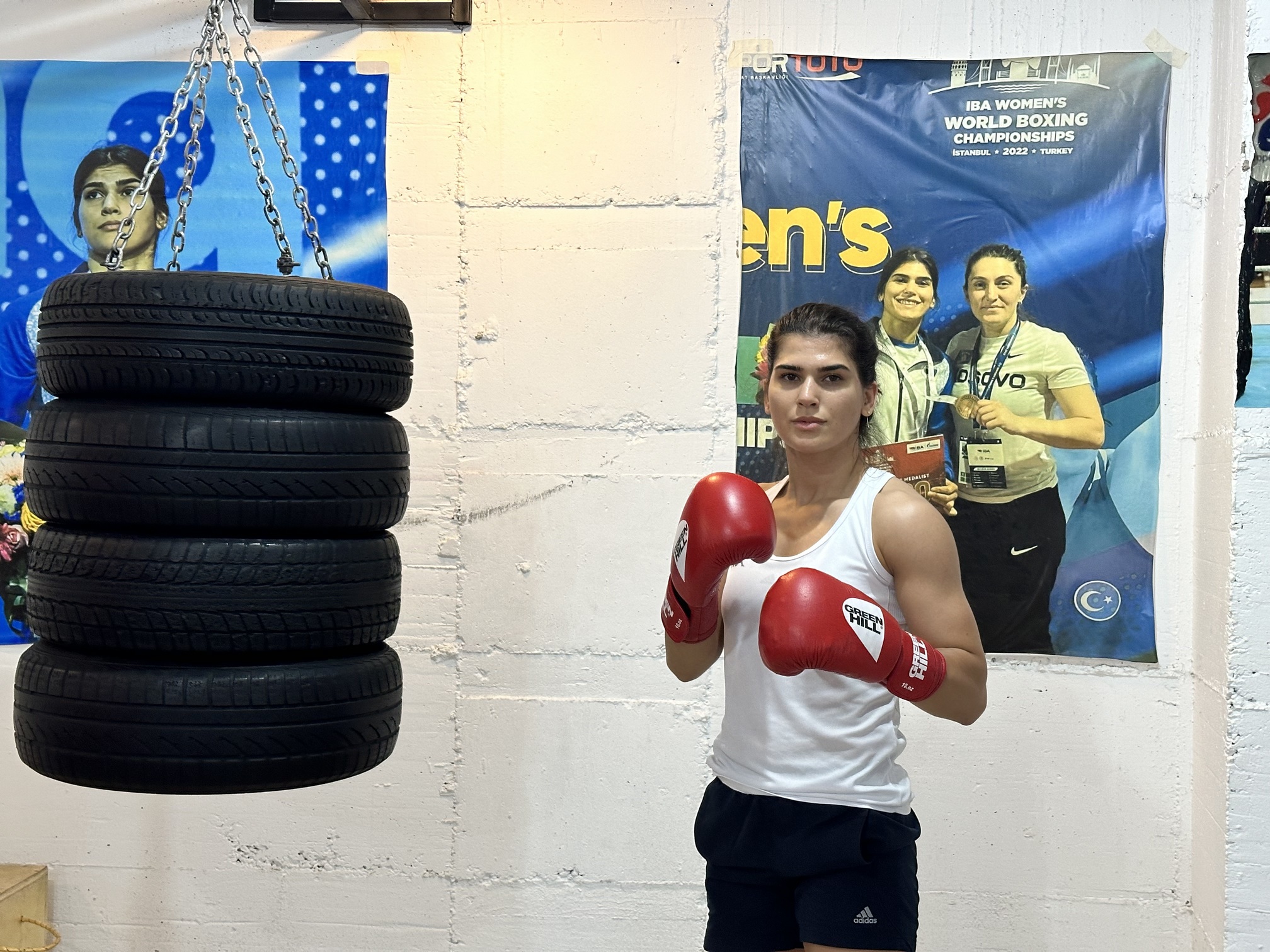
Donjeta Sadiku at the gym - photo A.Berisha
Twenty-five years have passed since the end of the armed conflict in Kosovo: an entire generation, born during the 1999 war, is approaching adulthood with a heavy legacy, but also strong hopes for the future. Will it be a generation of peace?
Donjeta Sadiku and Vesa Goci, who do not know each other personally, share a unique bond: both belong to a generation born amidst the flames and ruins of the 1999 war. Their 25th birthday coincides with the 25th anniversary of the liberation of Kosovo, a testament to their resilience and strength. On 12 June 1999, a significant date in the country’s history, the first NATO ground troops were deployed in Kosovo.
"My mother told me that when I was born, in the hospital, they had no water to drink, and she suffered a lot," Sadiku – born in July 1999, a few weeks after the liberation – told OBCT.
Vesa, born in May during the NATO bombings against the Serbian forces, also came into the world in difficult conditions, when the future was still uncertain.
"My birth was not ordinary. I was born in the state hospital in Pristina, a place full of tension and uncertainty. My mom was anxious and she wondered what the future would hold for us," Vesa told OBCT.
According to Linda Gusia, the Head of the Sociology Department at the University of Pristina, young people born in 1999 belong to a peace generation or, as it is defined in scientific literature, a post-memory generation.
"These are generations that have no personal memories of what happened, but have inherited trauma from their parents or relatives, and continue to struggle with post-traumatic stress which, unfortunately, has never been properly treated," Gusia said to OBCT.
Given that this year marks the 25th anniversary of Kosovo's liberation from Serbia, the country’s leadership, especially during the commemorative days, addresses its promises mainly to young people, who represent an important segment of the population.
Kosovo boasts many young talents – some have remained in the country, others have emigrated abroad – also in some sectors booming independently, such as information and communication technologies. Kosovars seem enthusiastic about talents like boxer Donjeta Sadiku, who has won several medals at world and European championships, and praise judoka Majlinda Kelmendi, who eight years ago gave Kosovo its first Olympic gold. There are other examples too.
While 25-year-olds, like Donjeta and Vesa, reflect on how historical context influenced their path to success, Arben Hajrullahu, professor and head of the Political Science Department at the University of Pristina, expresses concerns that, in the absence of adequate education system, new generations may encounter difficulties in fully exploiting their potential.
"The main problems of this generation are related to the Kosovar education system, which over the last twenty-five years has left much to be desired. A quality education system is a prerequisite for the generation born during the war to catch up economically, engage in public life and active citizenship, and be aware of its role in society," Hajrullahu told OBCT.
He also pointed out that political activism focused on issues of public interest is in decline due to apathy stemming from the belief that the situation cannot change.
"It is important – explained the professor - that the state creates a regulatory authority with tax policies aimed at achieving social justice in order to stimulate young people to actively engage in the public sphere".
For Vesa, who works in the business sector, access to quality education is essential to unlock the potential of her generation.
"My generation is very innovative and technologically adept, we are ready to lead the digital transformation of Kosovo, developing various solutions to the challenges facing our country”, she said.
In a different setting, I find Donjeta Sadiku doing her boxing workout, preparing for the Paris Olympic 2024 in a private box center in Pristina. The conditions in the center are unworthy of an athlete like Donjeta. However, the young boxer does not complain nor does she let herself be discouraged by political obstacles.
"I believe I was born at the right moment to show the world what kids this young country has”, Donjeta told OBCT, adding that she was not allowed to compete under the flag of Kosovo four times.
"I wish to represent my country, Kosovo, despite the problems we may have regarding the recognition of our independence by other countries. Every refusal made me stronger, now I can participate in the Olympic Games in Paris and, I am convinced, I will return home with a medal".
Beyond national issues, young Kosovars – according to sociologist Linda Gusia – have to face other battles, even more difficult and unpredictable than those faced by the 90s generation.
"We didn't care much about young people; it was difficult to be a child after the war, now those children have grown up and have other battles to fight. They have experienced a global pandemic, the world is warming, and they are aware of the difficulties they will face”, Gusia explained.
On the occasion of the 25th anniversary of the liberation of Kosovo, former UK Prime Minister Tony Blair, in his speech to the Kosovo Parliament on 10 June, expressed his confidence in the potential of young generations to shape the future of Kosovo.
"Imagine that talented youth able within Kosovo and as part of Europe to help develop the technological innovation that will transform the world”, Tony Blair said.
















 To Top
To Top